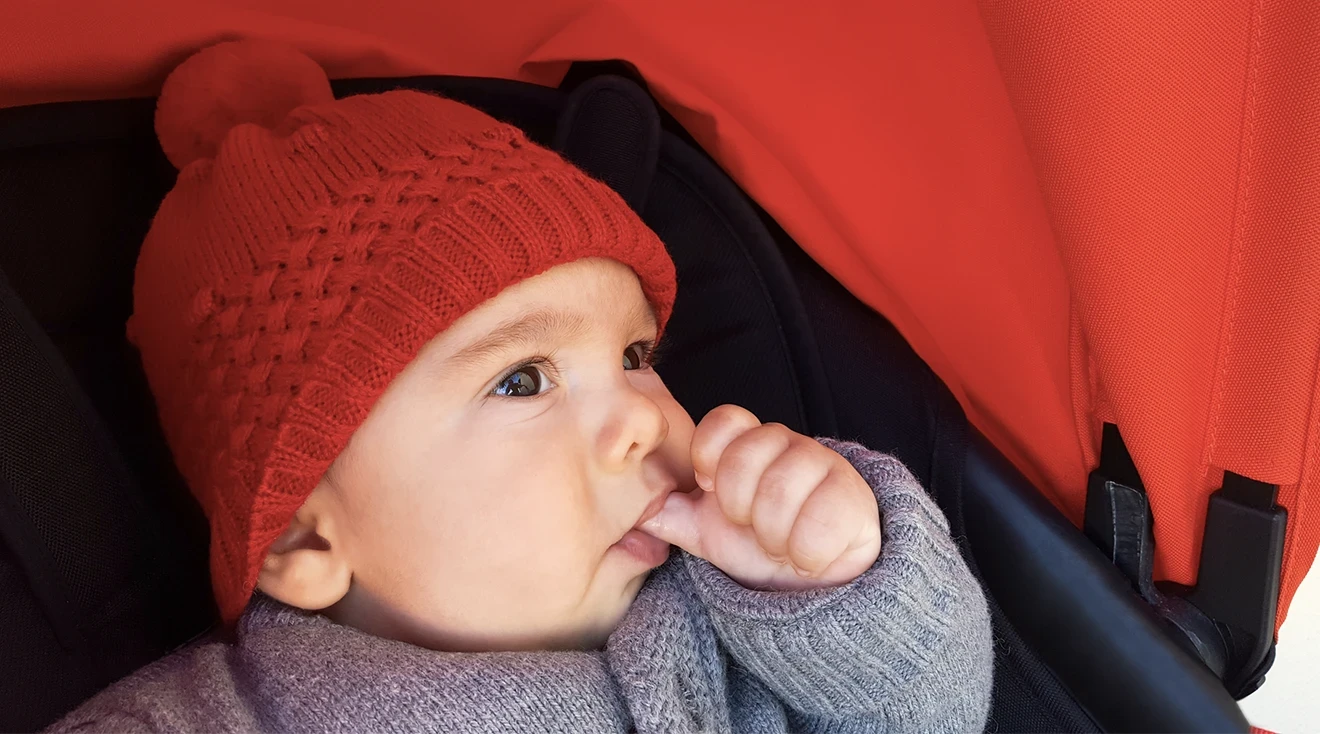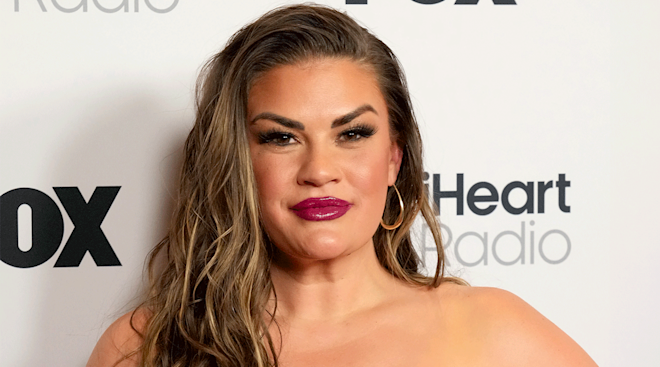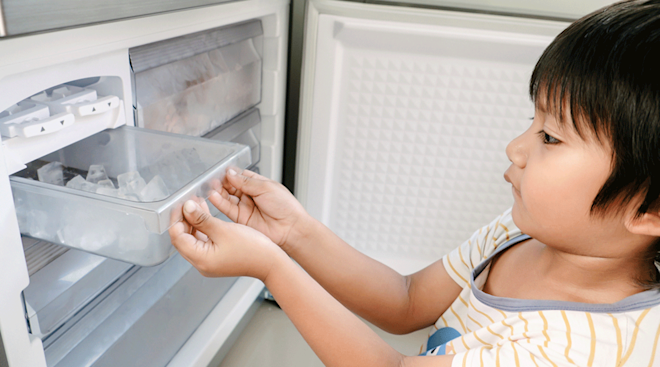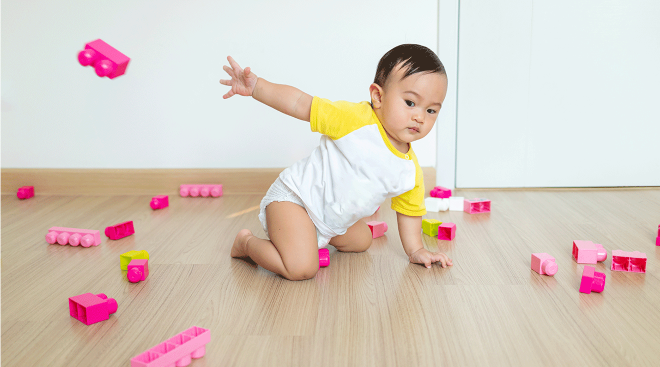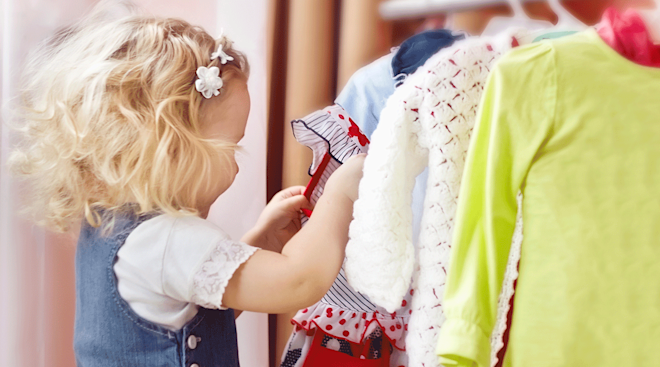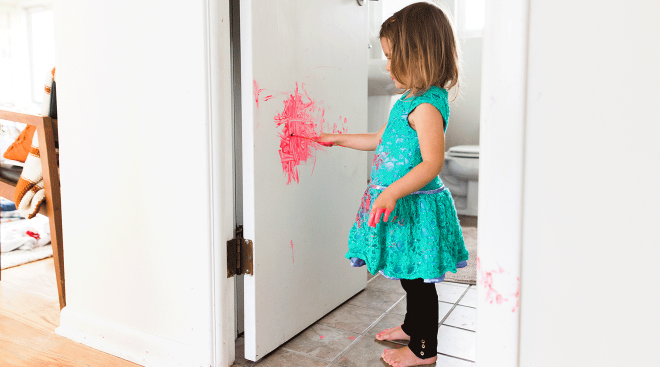Why Babies Suck Their Thumbs—and When to Curb the Habit
Thumb sucking is one of the most universal baby behaviors. It can even be observed in utero via ultrasound—and, according to Stanford Health, an estimated 90 percent of infants show some form of hand sucking as soon as two hours after birth. Of course, while it’s charming (and helpful) in babyhood, the habit becomes less adorable (and more problematic) as kiddos get older. So why do babies and toddlers suck their thumbs, what are the benefits of this behavior and when do potential consequences emerge? Read on for the full lowdown, and get tips on how to stop thumb sucking before it causes any dental, breathing or speech issues.
Pediatric experts at Stanford tell us that babies are born with a series of reflexes needed for survival, including a sucking reflex; when something comes into contact with the roof of their mouth (usually a human nipple or bottle), they automatically start sucking. This reflex is important because it’s how baby gets all their nutrition in the first few months of life.
But there’s another reason that babies are suckers for sucking: It feels good—plain and simple. Whether we’re talking about a pacifier, nipple or finger, sucking on something can be comforting. “It’s a way for a child to self-soothe, feel good or fall asleep,” explains Stephanie Jeret, MS, CCC-SLP, a speech-language pathologist in New York City. And this isn’t just speculation; one study found evidence that thumb sucking stimulates a nerve that releases psychological and physical tension. For many parents, baby’s ability to calm themselves is a welcome reprieve.
Miriam Mandela Frankel , OTR/L, a mental health occupational therapist at the Thrive Group in New Jersey, notes that there’s another reason why sucking can be a comfort: “Thumb sucking requires baby to bring their little thumb to the midline,” she explains. “Anything which is in the midline of the body is calming and soothing.” This is also why some children like to touch their naval areas or pick their noses.
What’s more, sucking on a thumb or pacifier has one very strong benefit beyond baby’s comfort: It’s been shown to reduce rates of SIDS (sudden infant death syndrome), notes the National Library of Medicine. Research suggests that sucking helps open and stabilize baby’s upper airway, helping them to breathe. To that end, thumb sucking may not be such a bad habit after all—especially if baby is under one.
Of course, all good things must come to an end. And, eventually, thumb sucking can have consequences. Concerns about thumb sucking—or any finger sucking—tend to revolve around what can happen if the habit is prolonged. The effects can vary depending on how long it continues and how aggressively your child sucks.
When thinking about thumb sucking, teeth tend to top of mind, and it’s true that dental issues are a big potential issue. “Eventually, with enough pressure and time, thumb sucking will result in flaring of the top baby teeth, an open bite (which is a space between the upper and lower teeth) and constriction of the upper bones of the jaw,” explains Megan Miller, DDS, a pediatric dentist in Bellevue, Washington.
Also, Jeret notes that shifting teeth may move back once the habit stops. If bone growth is impacted, baby’s palate shape can change. “While palatal expanders and braces exist, our tongue is the mouth’s natural palatal expander and the lips are the mouth’s natural braces for the teeth,” explains Jeret. In other words, if the tongue, at rest, is on the roof of baby’s mouth, the palate will expand properly, and the teeth won’t become overcrowded. On the other hand, if the tongue rests at the bottom of the mouth (like with thumb sucking), it can cause all sorts of orthodontic issues, including a narrow upper jaw and upper teeth not meeting the bottom teeth properly. Moveover, baby’s airway and breathing can be affected by bone growth issues. This can cause mouth breathing and sleep disordered breathing, adds Jeret.
In addition to dental and breathing issues, persistent thumb sucking may impact speech, potentially causing speech production issues or delays.
So when do you need to put your foot down about thumb sucking? “Ideally kids would stop on their own by their first birthday,” says Miller. “But as a pediatric dentist, I know that what’s ideal is not always practical.” The reassuring news: Your little one should visit the dentist around the one-year mark—and they’ll flag any problematic developments. “If we see changes to teeth position or bone growth, we’d recommend prioritizing techniques to stop,” says Miller. In the absence of budding issues, she recommends discouraging the habit by the time your toddler is 3. That said, most kids stop thumb sucking on their own by age 4, notes Stanford Health.
If thumb sucking is still going strong beyond the toddler years, Jeret says that parents should really step in to help kiddos kick the habit before adult teeth start to come in. That said, she acknowledges that there are exceptions to this rule. “A parent has to understand that sucking is providing something for the child, whether it be relaxation or ability to fall asleep,” she notes. “To shame a child into eliminating this habit won’t be beneficial.” As always, it’s a good idea to check with your dental or medical provider for specific guidance.
There are a number of strategies that can help curb thumb sucking. Some of these steps depend on your kid’s age, why they’re engaging in the behavior, whether it’s a day or night habit, their personality and your parenting style.
How to get baby to stop thumb sucking
Wondering how to get your infant to stop thumb sucking? While there’s no pressing need to stop baby from sucking their thumb, some parents try to avoid the habit altogether.
At this stage, your little one is probably doing it for comfort, so you can try to provide an alternative that they can similarly hold at their midline. “Giving them something which feels cozy—or that they can chew and nub—would be a good replacement for their thumb sucking,” says Frankel.
If you’re open to a pacifier, you can introduce one as an option too. While pacifiers come with some of the same potential consequences as finger sucking, they’re not physically attached to baby’s body. Moreover, pacifiers are softer so they may cause less damage to teeth, notes Stanford Health.
How to get a toddler to stop thumb sucking
Once your child develops verbal communication and comprehension skills, it opens up a whole new world in terms of the strategies you can try. Here’s how to start:
- Determine when they’re thumb sucking. Before stepping in to stop the habit, the Mayo Clinic recommends taking some time to observe your child’s patterns. Do they suck their finger when falling asleep, or is it a daytime response to boredom or anxiety? Once you’re better able to pinpoint the motivation, you’ll be in a better position to come up with a plan.
- Raise awareness. Kids often stick their fingers in their mouth without even thinking about it, so Jeret recommends helping your child have some self-awareness around the habit. You can do this simply by asking if they notice they’re doing it when it begins.
- Offer rewards. A sticker or other reward chart can sometimes provide helpful motivation for a child who is both old enough to understand and has some desire to stop.
- Find replacements. If your child is thumb sucking to unwind and self-soothe, Jeret suggests finding a new creature comfort for your child. A stuffed animal for nighttime snuggles or toys that can keep their hands busy during the day may help.
It’s important for parents to realize that finger or thumb sucking is common and natural for babies and toddlers. Each child is unique, and while some may never feel the need to comfort suck, others will have a hard time kicking the habit. If your child is resistant to stopping, it’s helpful to approach it with compassion rather than shame. Remember, it’s a process—they’ll get there.
Please note: The Bump and the materials and information it contains are not intended to, and do not constitute, medical or other health advice or diagnosis and should not be used as such. You should always consult with a qualified physician or health professional about your specific circumstances.
Plus, more from The Bump:
Stephanie Jeret, MS, CCC-SLP, is a speech-language pathologist and the owner of Speak with Stephanie LLC. She specializes in the evaluation, diagnosis and treatment of a variety of communication disorders, including articulation disorders, receptive/expressive language disorders and fluency disorders. Stephanie received her masters of science in speech-language pathology from Brooklyn College in New York City.
Miriam (Manela) Frankel, OTR/L, is a mental health occupational therapist, founder and director of the Thrive Group, a sensory gym providing pediatric occupational therapy; and the online platform Bloom, where she teaches the Thrive method. She is also the coauthor of The Parent-Child Dance and an international speaker.
Megan Miller, DDS, is a board-certified pediatric dentist and founder of Expedition Pediatric Dentistry in Bellevue, Washington. Miller’s practice focuses on collaborative decision-making and evidence-based dentistry to optimize oral health. She earned her doctoral degree from Texas A&M University Baylor College of Dentistry in Dallas, Texas.
Stanford Medicine Children’s Health, Thumb Sucking
Stanford Medicine Children's Health, Newborn Reflexes
Minerva Pediatrics, Finger or Thumb Sucking. New Interpretations and Therapeutic Implications, August 2015
TheBMJ, Use of a Dummy (Pacifier) During Sleep and Risk of Sudden Infant Death Syndrome (SIDS): Population Based Case-Control Study, January 2006
Mayo Clinic, Thumb Sucking: Help Your Child Break the Habit, September 2022
StatPearls, Thumb Sucking, May 2023
Learn how we ensure the accuracy of our content through our editorial and medical review process.
Navigate forward to interact with the calendar and select a date. Press the question mark key to get the keyboard shortcuts for changing dates.
































